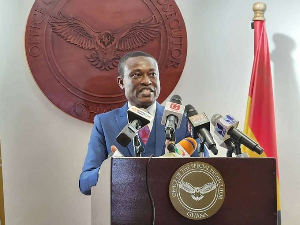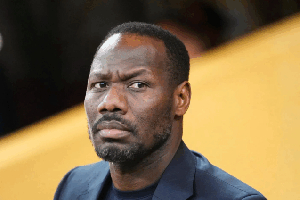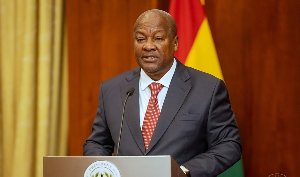Though Ghana is far away from the major earthquake zones of the world, it is prone to earthquake disasters. Ghana has records of damaging earthquakes dating as far back as 1615.The last three major events occurred in 1862, 1906 and 1939.
Dr Ishmael Norman in an interview on Joy FM’s Thursday revealed that the world experienced over 470 earth tremors on Wednesday, June 24, 2020 and he cautioned that a bigger earthquake may be approaching due to the steady increase of earth tremors across the globe.
Former first lady Rosalynn Carter once said, “A leader takes people where they want to go. A great leader takes people where they don't necessarily want to go, but ought to be.” We are very much aware of the consequences and other possible impacts when an earthquake or a serious flood occurs in our beloved country. Most developed countries find it difficult to recover from the impact of earthquakes and floods.
Flood and earthquake perils engineer both property damage and injury/death to people. These are also fundamental risks and vast landscapes and the majority of people are affected upon its occurrence.
We know the rising cost of building. Most property owners would not be in the financial position to rebuild the same properties now in the event they lose them. Most people complete their building a few years before their retirement.
This tells you how difficult it is to build during working age. Most residential property owners do not know any better way to secure their financial loss regarding damage to their properties.
The truth is that, there are a lot of private insurance companies in Ghana offering Fire and allied perils insurance policies for material damage for both commercial and residential properties. This policy covers perils like collapse of building, storm damage to building, earthquake, flood, explosion, burst pipe, impact from vehicles and others.
One would be very surprised why people would not insure their properties after going through such destitution to complete them. The premiums are also not that expensive as compared to the compensation that could be received when there is a loss.
For instance, a private building worth GHS100,000.00 would pay a yearly premium around an amount of GHS200.00 or a little above this based on other risk factors. Most residential property owners are also not even aware of such policies in the insurance market. The public awareness on these policies are very low. Others might not insure because of other various personal reasons.
The citizens are all aware of the risk we face as a country when it comes to floods and earthquakes. We have deep knowledge of the consequences when any of these two risk events happen. This is why I firmly believe that the Executive and the Legislative instruments should start and make provisions for the future.
Can the government of Ghana exonerate itself when there is a serious flood or earthquake and the majority or greater section of the people are affected? NADMO always comes to the aid of people who are affected when there is flood.
Insurance has been used to solve a lot of societal problems like Unemployment, Job Loss, Retirement, Agriculture, work related injuries and death, etc in other jurisdiction.
Government can institute a program which will specifically be in place to pay compensation for the affected majority when there is flood or earthquake in Ghana. I believe we should not sit and wait for the day to come. We have to be prepared as a country for some of these eventualities.
The capital city, Accra has been struck by damaging earthquakes as well as many minor tremors from time to time. Instrumental recordings of earthquakes have indicated continuous micro-seismic activity in southeastern Ghana. There have been a lot of predictions on when we will experience the next earthquake. Flood has become a yearly ritual in the country.
The major cities are densely populated and they were not planned well.
People have been allowed to build on waterways and other places they were not supposed to build. Flood is with us now and there is little we can do about this.
Private commercial insurance companies have policies in place which cover these two perils and other allied perils but I am of the firm believe that, we should have the ‘National Flood and Earthquake Insurance Program’ (NFEIP) because of some of the following reasons:
1.This National program could be a compliment or the basic cover to what the private insurers are providing since this would cover only two perils (flood and earthquake).
2.This is also important because insurers might also need government bailout when affected by these same major catastrophes.
3.It is not every property owner who would insure with the private insurance companies.
4.Premiums become very low when every property or everyone is paying for flood and earthquake risk cover.
5.Governments through the Municipal and District Assemblies can levy individual households a certain fee to start this program.
6.We can consider the benefits of investing in these pools of funds when there is no loss or such events have not occurred.
7.It would not be only property owners that would be affected hence the need for everyone to pay a little into this fund.
The icing on the cake and to make this much easier is the digital address system in place. This would help to identify each property no matter wherever it is and aid registration if need be.
I will personally challenge my fellow Ghanaians that, if we want to push for the agenda of ‘Ghana beyond aid’ then we the citizens should not be content with aid. With the current local events registering more than 4.0 on the Richter scale, the Geological survey department has embarked on an intensive education on earthquakes to the general public and schools.
I am very sure we can start a debate on whether to have this or not through our education. We can deliberate on how to raise fund for this program. Earthquake might not happen during our time, but we would still have made provisions for the next generation. “wonsom wonsom, wo ne nipa…………….”
Opinions of Monday, 29 June 2020
Columnist: Justice Peprah Agyei















